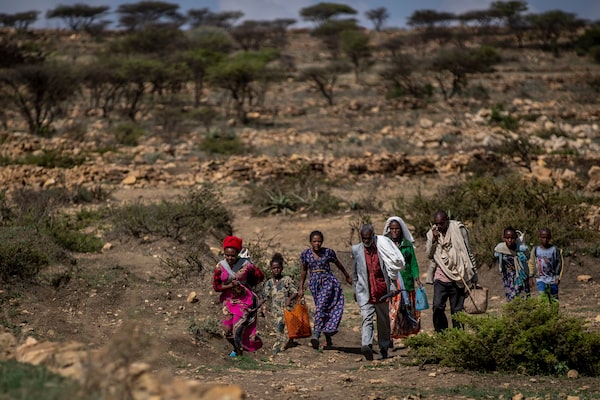
People walk from a rural area toward a food distribution operation by the Relief Society of Tigray, near the town of Agula, in the Tigray region of northern Ethiopia on May 8, 2021. Ethiopia's warring sides have agreed to a permanent cessation of hostilities in a two-year conflict, negotiators announced this week.Ben Curtis/The Associated Press
As a humanitarian official and health expert for three decades, Mukesh Kapila witnessed the horrors of genocides in Rwanda, Cambodia, Bosnia and Darfur. Now he is trying to alert the world to another emerging genocide: this time in Ethiopia.
The doctor and scholar, who has written two books on genocide, is urging Canadian MPs to investigate crimes against humanity in the Tigray war in northern Ethiopia. He is one of a series of experts at a parliamentary committee in Ottawa who have called for Canadian legal action – including possible steps under international laws against genocide.
Despite a peace deal signed by Ethiopian and Tigrayan officials last week, it is still unclear whether the bloodshed will stop. Early signs suggest the ceasefire is already being violated, and a blockade of food and medicine has continued. The MPs say they will push ahead with their Tigray report as urgently as they can, spurred on by witnesses who described mass rapes and starvation.
“A lot of the testimony was gut-wrenching,” said Liberal MP Sameer Zuberi, chairman of the Commons subcommittee on international human rights.
“It was extremely hard to listen to,” he told The Globe and Mail. “Testimony, for example, from physicians who treated women who were sexually abused in unspeakable ways. Shocking sexual violence as a means of terrorizing and brutalizing a population.”
He said the subcommittee is likely to issue a report or statement on Tigray within weeks, before Parliament breaks for the holidays next month.
“What the experts were saying at committee was that this meets the legal definition of genocide, so that must be taken very seriously,” he said.
Another MP on the subcommittee, NDP foreign affairs critic Heather McPherson, said the members still need to reach a formal decision on their report, but the testimony has seemed compelling to her. “The testimony we’ve heard from experts, from victims, from Tigrayan civilians, all points very clearly to me toward a genocide taking place,” she told The Globe.
The war began in November, 2020, when Ethiopia sent troops into Tigray in an attempt to subdue the region’s recalcitrant government. Since then, as many as 600,000 Tigrayans have died from war-related causes, including violence, starvation and lack of medical care, according to estimates by researchers at a Belgian university.
In his testimony, Dr. Kapila described a pattern of dehumanizing hate speech in Ethiopia’s state media, co-ordinated attacks on civilians in Tigray, a deliberate blockade of food and medicine to the region, and the systematic destruction of urban and rural livelihoods by cutting off electricity and communications – all orchestrated by the command and control structures of the Ethiopian and Eritrean authorities.
“My professional assessment is clear, based on my experience of nearly 30 years of international war and peace efforts,” Dr. Kapila said. “Progressive acts of genocide are being perpetrated by the governments and agents of the states of Eritrea and Ethiopia against Tigrayans.”
Another witness, Toronto-based human-rights lawyer Sarah Teich, told the committee there is sufficient evidence of genocide in Tigray to compel Canada to take action under its international treaty obligations to prevent genocide.
“There is mounting evidence of intent to destroy Tigrayans as a group,” said Ms. Teich, who was testifying on behalf of a Canadian Tigrayan organization.
Citing reports from human-rights groups and a United Nations investigation, she said the brutal sexual violence was a “defining feature” of the war and it had genocidal intent, “suggestive of an intent to destroy the Tigrayan ethnicity.” Tigrayan women, often targeted for gang rape, were told by their assailants that “a Tigrayan womb should never give birth,” she said.
The committee heard graphic medical accounts from physicians and hospital officials who witnessed the damage inflicted on Tigrayan women and girls from gang rapes during the war.
Hayelom Kebede Mekonen, a former senior official at Tigray’s biggest hospital, Ayder Referral Hospital in Mekelle, counted 533 rape victims who needed treatment from the hospital during the first six months of the war alone.
“All of this rape is not just an incident – it is a systematic campaign to subjugate the whole of society so that they will live in fear and panic and be submissive to the central government,” he told the committee. “In my view, all this amounts to a genocide and sexual slavery happening in Tigray.”
The testimony has been echoed by similar warnings from UN officials and other international experts on genocide. In a statement on Oct. 25, the U.S. Holocaust Memorial Museum said it was deeply concerned about “further crimes against humanity and a heightened risk of genocide” in Tigray, especially for civilians in towns captured by Ethiopian forces and their allies in recent weeks.
Last week, when Ethiopian and Tigrayan officials signed a peace agreement after 10 days of negotiations in South Africa, many observers were hopeful that the killing would finally end and the blockade of Tigray would be lifted. But on the weekend, there were reports of continuing fighting in several places in the region, and humanitarian aid supplies to Tigray were still halted.
Several analysts said they were worried the peace agreement will unravel, partly because many Tigrayans see it as a one-sided deal that could leave the region defenceless and dominated by the Ethiopian government.